The cost of supplying the main gas and related approvals pushes many owners of suburban real estate to organize a private house. Electricity is a great alternative to gas, safer and does not require special permits. The only drawback in this heating method is the cost of paying bills for the kilowatts used. In this publication, we will try to figure out whether it makes sense to heat a country house with electricity.
Possible methods of electric heating of a private house
There are two principles on which everything (CO) is built:
- Direct. Heating of each room is carried out by devices powered directly from the mains.
- Indirect. In this principle, it is laid that heats the radiators installed in heated rooms.
There are many opinions about which electric heating in a private house is better. The main argument of the adherents of the indirect method of heating the home is the rather long cooling process of the coolant in the system, which gives advantages when stopping the boiler. Anyone who uses direct heating claims to benefit greatly from the purchase and installation of equipment.
How to heat your home with electricity
Let's consider the most popular options
- Water heating with electric boiler.
- Heating with electric convectors.
The first option involves the creation of a heating circuit, in which pipes are used to transport the coolant, radiators for transferring thermal energy to the room, as well as the devices and mechanisms necessary for the operation of the system (expansion tank, circulation pump, shut-off and control valves, safety and control devices).
FROM your home, according to the architecture of the building, design features and other factors.
The second option involves the installation of the required number of electric convectors in each room. The benefits are obvious: there is no need to create heating circuits, design and complex equipment installation. All work can be done independently without overpaying expensive specialists.
Consider the design features and the principle of operation of each heating option, which will make it possible to conclude whether it is possible to use electricity to heat private and country houses.
Electric boilers: design features, advantages and disadvantages
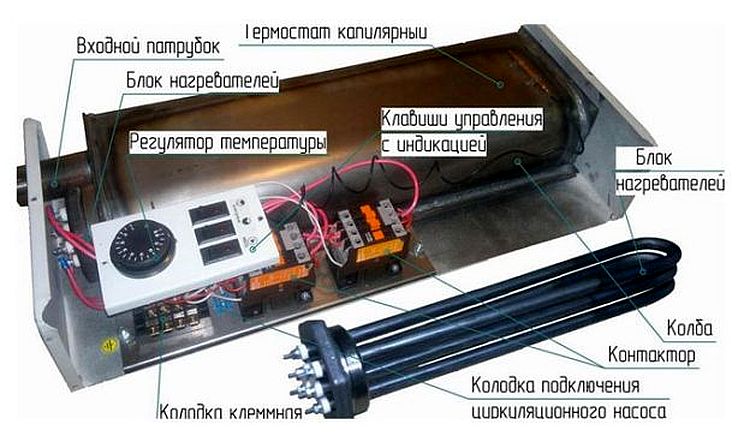
There are three principles of heating the coolant that are used in modern hot water heating boilers:
- Heating elements.
- Electrodes.
- Based on magnetic induction.
The first type of boilers is the most common. The coolant from the system enters the internal tank of the boiler unit, where it is heated by tubular heating elements, after which it enters the CO.
This type of equipment is safe, functional, has built-in automation to control the temperature of the coolant and air in the room.
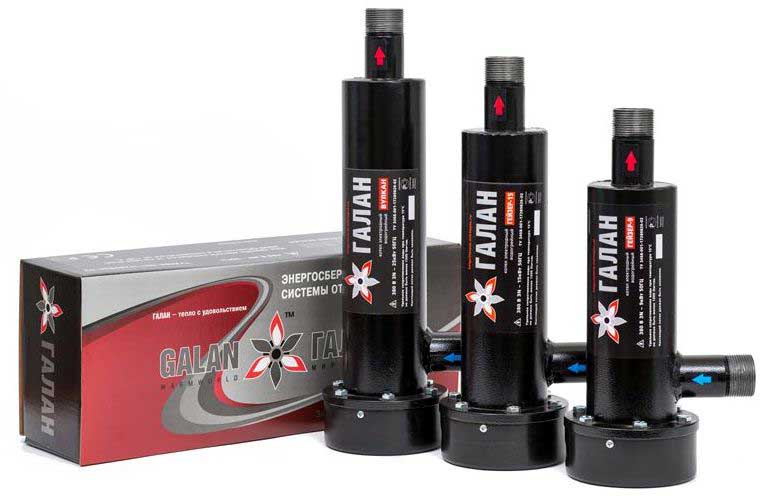
In electrode boilers, a completely different principle is used to heat the coolant. The heating element in them consists of a pair of electrodes to which a high voltage is applied.
Electric current, passing from one electrode to another, heats the coolant, after which it enters the CO.
Important! In boiler plants of this type, the electrolysis process does not occur (which excludes the appearance of scale), since an alternating voltage with a frequency of at least 50 Hz is used. Depending on the intensity of use, the electrodes become thinner over time and their ability to heat is lost. Replacing the electrodes is a standard procedure in electrode boilers.
Structurally, induction ones look more attractive, although much more complicated. In this type of installation, there are no (familiar to everyone) heating elements.
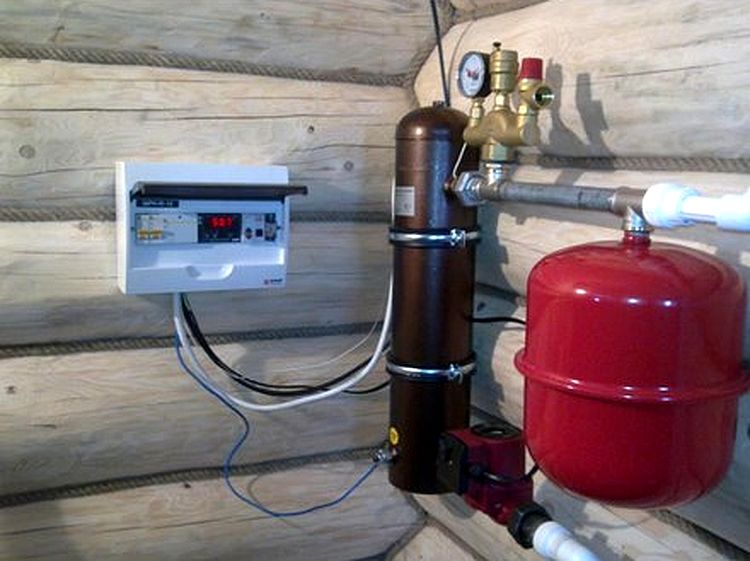
The coolant flows through a heat exchanger, which is part of a magnetic circuit, in which a powerful magnetic field is generated. It is this that heats the heat exchanger and the coolant that circulates through CO.
Electric heating of a country house, through indirect heat transfer, has its advantages over gas and air heating in the following: electric hot water boilers are quite reliable, have high efficiency and do not require a chimney.
As the disadvantages of such heating at home, it can be noted that the use of electric boilers requires good wiring, stable voltage in the network.
The creation of water CO with an electric boiler requires significant initial costs, especially if you involve a third-party organization for the development of the project, installation, adjustment and balancing of the system. You should be prepared for additional costs, which include regular flushing of radiators, checking the operation of valves, etc.
Electric convectors: design and principle of operation
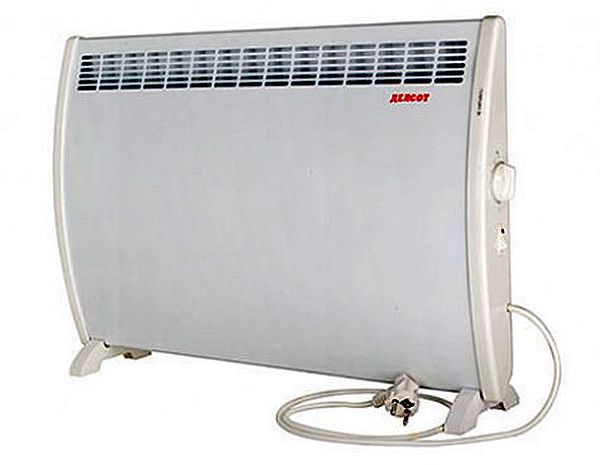
The design of the convectors is simple and therefore effective: dry heating elements are placed in the lower part of the metal (steel, aluminum) housing, the operation of which is controlled by an adjustable thermostat. The air heats up, rises and exits through the grill at the top of the cabinet. The "vacated" space in the device body is occupied by colder air masses, which, when heated, go out through the grate into the room. Air circulation takes place, which ensures uniform heating of the heated room.
Today, on the Russian market of climatic technology presented the widest range of convectors, which differ in power (from 1 to 5 kW), design and installation method (floor, wall, universal).
Requires minimal upfront purchase and wiring inspection by a qualified electrician. The difficulty lies in the selection of the required power and the number of convectors. This will require calculations that are carried out by specialized organizations based on data on the heat loss of each room. However, you can also be guided by approximate data: to heat 10 m 2 of a private house, 1 kW of power is required. For a room of 10 m 2, one small convector of 1 - 2 kW is needed, which can be purchased in specialized stores for less than $ 100. For example, in one of the largest federal online stores RUSKLIMATE a huge selection of convectors from 2241 rubles, and when ordering through the site, there is also a 3% discount. And in the climate company mircli.ru convector prices start from 2260rub .
Heating with electricity: benefits, costs, conclusions
In order to answer the question of whether it is possible to heat a private house with electricity, some calculations should be made.
Initial data: a brick house with basic insulation of the attic and floor, an area of 150 m 2. Moscow region. We proceed from the data that heating 10 m 2 requires 1 kW of thermal power. Heating such a property requires 15 kW of electricity per hour. In practice, during the heating season, there are about half of such days when such power is not required. We take the average value - 7.5 kW / h for heating the original country house.
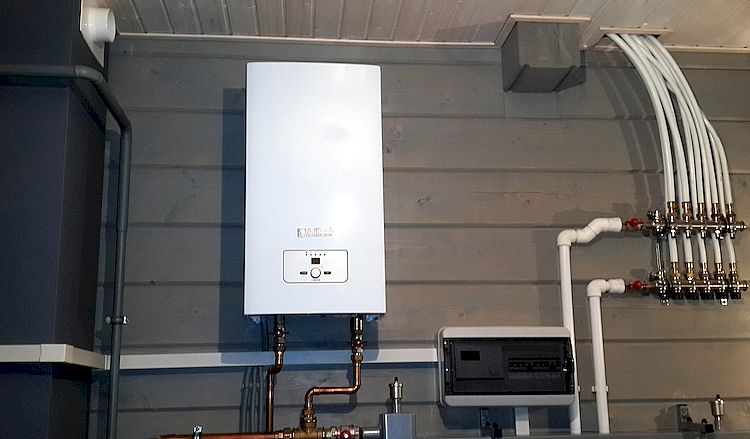
So: 7.5 kWh multiplied by 24 hours and 30 days. We get 5400 kW. Since the average duration of the heating season in the central region of the country is 5 months, we multiply the resulting value by 5 and by the cost of 1 kW / h in Moscow (5.03); 5400 x 5 x 5.03 = 135,810 rubles. This figure shows the cost of paying for electricity for the use of electric CO for one season. It is worth adding to this the cost of equipment: for convector heating it will be 300-400 USD. For the water system, this amount will increase to 8-10 thousand USD for the creation of a JI project, the purchase of equipment and the cost of installation and commissioning.
For example, gaseous CO will incur the following costs:
- The purchase of the necessary equipment, design, installation and commissioning works will amount to 10-13 thousand cu.
- With a boiler plant efficiency of 90%, the average gas consumption for the original country house will be 3.5-4 thousand m 3 per season. In Moscow, the cost of 1 m 3 of gas varies within 6 rubles. In total, 24 thousand rubles will be spent per season.
- The cost of connecting to the gas main is over half a million rubles.
Without even going into details, the difference in operating costs is visible, on the basis of which we can conclude: gas heating is cheaper, apart from the grandiose initial investment.
Advice: if there is no opportunity, funds or desire to use gas as an energy carrier, then the most economical way to heat a house with electricity is to use electric convectors.

